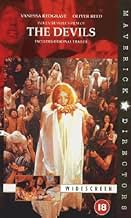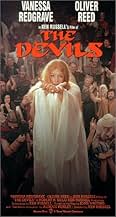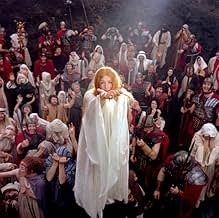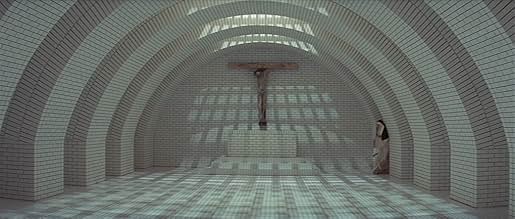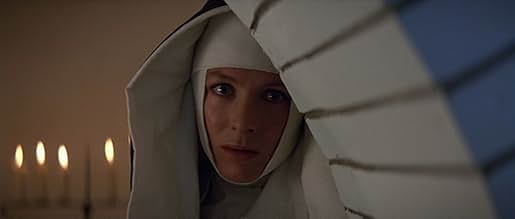In 17th-century France, Father Urbain Grandier's protection of the city of Loudun from the corrupt Cardinal Richelieu is undermined by a sexually repressed nun's accusation of witchcraft.In 17th-century France, Father Urbain Grandier's protection of the city of Loudun from the corrupt Cardinal Richelieu is undermined by a sexually repressed nun's accusation of witchcraft.In 17th-century France, Father Urbain Grandier's protection of the city of Loudun from the corrupt Cardinal Richelieu is undermined by a sexually repressed nun's accusation of witchcraft.
- Awards
- 4 wins
Izabella Telezynska
- Sister Iza
- (as Iza Teller)
Tony Allen
- Spectator
- (uncredited)
- Director
- Writers
- All cast & crew
- Production, box office & more at IMDbPro
Storyline
Did you know
- TriviaA major sequence in which the nuns tear down and ravish a life-sized icon of Christ in an orgiastic frenzy was cut from the film and subsequently vanished. Film critic Mark Kermode discovered the footage many years later. Ken Russell was keen to reinstate the scene but found that Warner Brothers were not interested in doing a director's cut. The footage can be seen in a documentary Kermode made about Russell and was subsequently included in an uncut DVD release.
- GoofsEarly in the movie when Urbain Grandier (Oliver Reed) is seen grooming his hair. It is a close-up of him supposedly looking at a mirror in the upper left hand corner of the screen, behind the viewer. Obviously there is no mirror as he consistently misses combing the more egregiously messed up parts of his hair and instead repeatedly combs the portions that are already groomed. In fact when he is done, his hair is still messed up.
- Crazy creditsAt the start of the film: "This film is based upon historical fact. The principal characters lived and the major events in the film actually took place."
- Alternate versionsIn 2012 the BFI persuaded Warners to allow them to release the film on video in the UK. Warners refused to allow the director's cut at all and would only allow the BFI to release the original 'X' certificate version on DVD. Warners refused permission to allow a hi rez release. The BFI produced a superb DVD transfer for the first time in its proper 2.35:1 ratio. The Channel 4 documentary 'Hell on Earth' was included but the 'Rape of Christ' sequence was removed. They also cut a line of dialogue when one of the actors refers to Warners as a bunch of 'c**ts'. Before this in the USA the 'unrated' version appeared as an upcoming release complete with sleeve art. 24 hours later Warners stopped the release!
- ConnectionsFeatured in Omnibus: Russell's Progress (1971)
- SoundtracksBourrée d'Avignon
from Secretum musarum (1615)
Music by Nicolas Vallet.
Played as the king's dance in the opening.
Featured review
Religious fundamentalism goes mad
When reading the following review, please keep in mind that I saw this film in slightly unorthodox circumstances. Without meaning to sound smug, the screening I attended took place at my University, was chaired by Ken Russell and was of a restored version of The Devils. The missing footage found by the critic Mark Kermode had been spliced back in and the film restored to the director's vision as close as possible. Given that I've never seen the original edit released to cinemas back in the 1970s and that this was only the second time this version had been screened, I think its fair to estimate that the film I'm reviewing will be significantly different to the one that is widely available so please keep that in mind.
Anyway...starting with a bizarre sequence involving an androgynous, foppish King prancing around a theatre stage done up like an Egyptian Queen, Ken Russell's The Devils is a film that over the course of its subsequent hour and forty minutes is liable to offend as many people as it will entertain. The extravagance of the Royal French Court filled with laughing nobles and brown nosing politicians resplendent in the very finest dark ages fashion is soon juxtaposed when the film turns a stark gaze on a rotting countryside filled with pestilence and disease. Maggot infested corpses line the road and the attention is quickly turned on the town of Loudun, where Priest Father Grandier battles not only the plague, but the political schemers who want to demolish the walls. Grandier is such a charismatic public figure however that the politicians are powerless, until they elaborate a plan to have him tarnished with accusations of blasphemy.
Central to this conspiracy is a chapter of Nuns living near by, of whom the hunched Sister Jeanne proves instrumental. Scared of her own sexual desires, the woman is driven mad by her very human nature and soon, the inquisition are knocking on her door and every woman in the building is being tortured and brain washed in the name of Christianity. The evils of religious fanaticism are plain to see, with Michael Gothard's scene stealing extremist Father Barre being the most disgusting example of a Priest you are ever likely to see on film. He batters and humiliates women for the sake of getting his own way and is so inflexible that he will send people to their deaths rather than admit his own fallibility. Controversial scenes abound as Barre's determination brings about nothing but misery, with the brainwashed nuns stripping off and indulging in a mass orgy, culminating in perhaps the most offensive scene when a statue of Christ is pulled down from the chapel walls and used by the nuns as a sexual play thing.
While it may depict blasphemy though, the film itself is not blasphemous and believe it or not, actually celebrates Christianity. It does so through the figure of Grandier (Oliver Reed at his very best), a man whose faith in God is so strong that he will not allow the misled elders of the Church deviate him from his path. He isn't a perfect man and has a weakness for the fairer sex, but he will not bow down to pressure or allow physical pain to weaken his love of God, he is a fine depiction of a Priest of which the Church can be proud.
However, religious sermonising isn't the chief attraction because let's face it, the reason most of us would want to see this movie is because it's controversial. With the aforementioned cavorting on the cross and nun orgies it's not hard to see why and the Inquisition don't exactly come off particularly well either as they stride around the countryside, bullying and torturing and ultimately teaching their flock to hate, not to love. Furthermore, The Devils is possessed (pun very much intended) by a ceaseless, madcap energy that is easy to get swept up in and over the course of the film, you will witness flagellation, nun on nun lesbian action, deranged inquisitors chanting "confess" as they beat people with hammers and (perhaps most bizarrely of all), Oliver Reed duelling with a man using a stuffed crocodile in place of a sword.
Yes, it is a bit uneasy to watch sometimes. Yes, at times it does resemble little more than visual extremity taken to the limit and no its not likely to find it's way into the Pope's DVD collection any time soon. The underlying message is ultimately a pure one though and it has the added benefit of being one of the most insane films you're ever likely to see, as well as making you glad you don't live in the middle ages. If you ever get a chance to see the restored version I couldn't recommend it higher.
Anyway...starting with a bizarre sequence involving an androgynous, foppish King prancing around a theatre stage done up like an Egyptian Queen, Ken Russell's The Devils is a film that over the course of its subsequent hour and forty minutes is liable to offend as many people as it will entertain. The extravagance of the Royal French Court filled with laughing nobles and brown nosing politicians resplendent in the very finest dark ages fashion is soon juxtaposed when the film turns a stark gaze on a rotting countryside filled with pestilence and disease. Maggot infested corpses line the road and the attention is quickly turned on the town of Loudun, where Priest Father Grandier battles not only the plague, but the political schemers who want to demolish the walls. Grandier is such a charismatic public figure however that the politicians are powerless, until they elaborate a plan to have him tarnished with accusations of blasphemy.
Central to this conspiracy is a chapter of Nuns living near by, of whom the hunched Sister Jeanne proves instrumental. Scared of her own sexual desires, the woman is driven mad by her very human nature and soon, the inquisition are knocking on her door and every woman in the building is being tortured and brain washed in the name of Christianity. The evils of religious fanaticism are plain to see, with Michael Gothard's scene stealing extremist Father Barre being the most disgusting example of a Priest you are ever likely to see on film. He batters and humiliates women for the sake of getting his own way and is so inflexible that he will send people to their deaths rather than admit his own fallibility. Controversial scenes abound as Barre's determination brings about nothing but misery, with the brainwashed nuns stripping off and indulging in a mass orgy, culminating in perhaps the most offensive scene when a statue of Christ is pulled down from the chapel walls and used by the nuns as a sexual play thing.
While it may depict blasphemy though, the film itself is not blasphemous and believe it or not, actually celebrates Christianity. It does so through the figure of Grandier (Oliver Reed at his very best), a man whose faith in God is so strong that he will not allow the misled elders of the Church deviate him from his path. He isn't a perfect man and has a weakness for the fairer sex, but he will not bow down to pressure or allow physical pain to weaken his love of God, he is a fine depiction of a Priest of which the Church can be proud.
However, religious sermonising isn't the chief attraction because let's face it, the reason most of us would want to see this movie is because it's controversial. With the aforementioned cavorting on the cross and nun orgies it's not hard to see why and the Inquisition don't exactly come off particularly well either as they stride around the countryside, bullying and torturing and ultimately teaching their flock to hate, not to love. Furthermore, The Devils is possessed (pun very much intended) by a ceaseless, madcap energy that is easy to get swept up in and over the course of the film, you will witness flagellation, nun on nun lesbian action, deranged inquisitors chanting "confess" as they beat people with hammers and (perhaps most bizarrely of all), Oliver Reed duelling with a man using a stuffed crocodile in place of a sword.
Yes, it is a bit uneasy to watch sometimes. Yes, at times it does resemble little more than visual extremity taken to the limit and no its not likely to find it's way into the Pope's DVD collection any time soon. The underlying message is ultimately a pure one though and it has the added benefit of being one of the most insane films you're ever likely to see, as well as making you glad you don't live in the middle ages. If you ever get a chance to see the restored version I couldn't recommend it higher.
- ExpendableMan
- Apr 25, 2007
- Permalink
- How long is The Devils?Powered by Alexa
Details
Box office
- Gross worldwide
- $2,293
- Runtime1 hour 51 minutes
- Sound mix
- Aspect ratio
- 2.35 : 1
Contribute to this page
Suggest an edit or add missing content


![Trailer [EN]](https://m.media-amazon.com/images/M/MV5BYjgxZTMwNzYtYmE4Zi00ZDNjLWJkZjUtNTQ1NGQ1ZWRmMDAwXkEyXkFqcGdeQXRyYW5zY29kZS13b3JrZmxvdw@@._V1_QL75_UX500_CR0)


